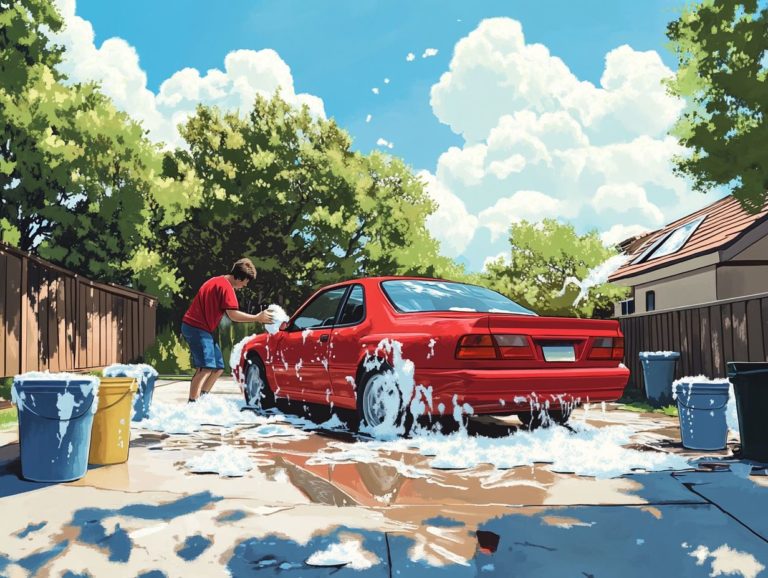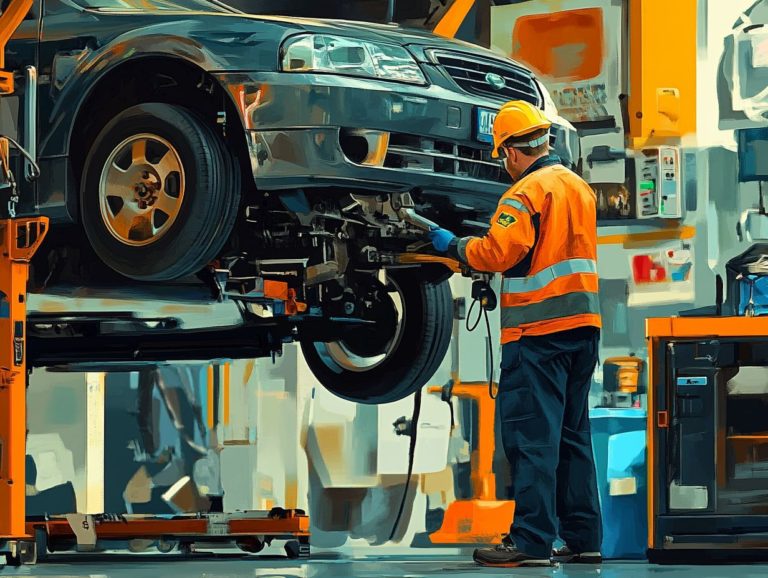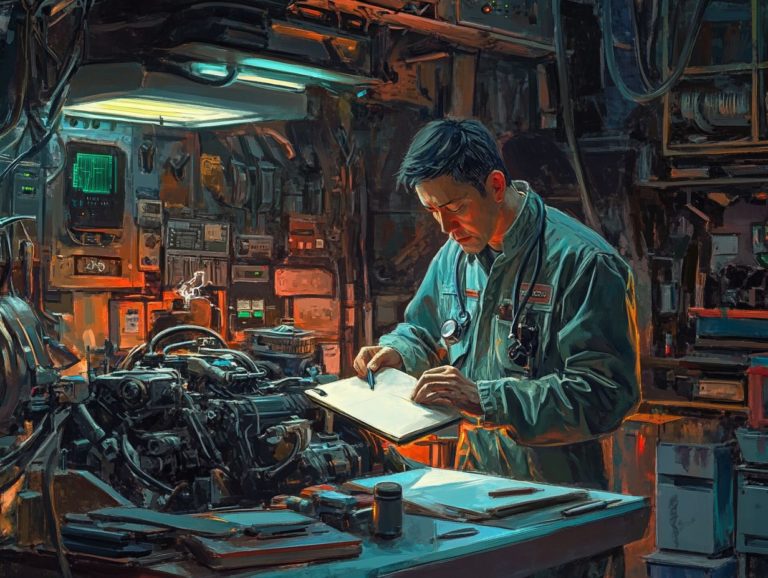What Are the Main Causes of Engine Overheating?
Engine overheating can be a driver s worst nightmare, often hinting at deeper issues that could lead to expensive repairs. Understanding the causes, recognizing the warning signs, and knowing how to prevent overheating are crucial for maintaining your vehicle’s performance.
This exploration delves into the common culprits behind engine overheating, provides practical maintenance tips, and outlines essential steps to take if your engine starts running too hot. Whether you re a seasoned car owner or just stepping into the world of vehicle maintenance, this guide equips you with the knowledge needed to safeguard your engine and ensure a smooth, safe driving experience.
Contents
- Key Takeaways:
- Common Causes of Engine Overheating
- Understanding Engine Overheating
- Signs and Symptoms of Engine Overheating
- Preventing Engine Overheating
- What to Do When Your Engine Overheats
- Professional Help for Engine Overheating
- Frequently Asked Questions
- What Are the Main Causes of Engine Overheating?
- How does a lack of coolant lead to engine overheating?
- Can a malfunctioning thermostat cause engine overheating?
- What factors can contribute to a blocked or leaking radiator?
- How can a broken water pump lead to engine overheating?
- What are some signs of worn out or faulty radiator hoses?
- What should I do if I notice my engine is overheating?
Key Takeaways:
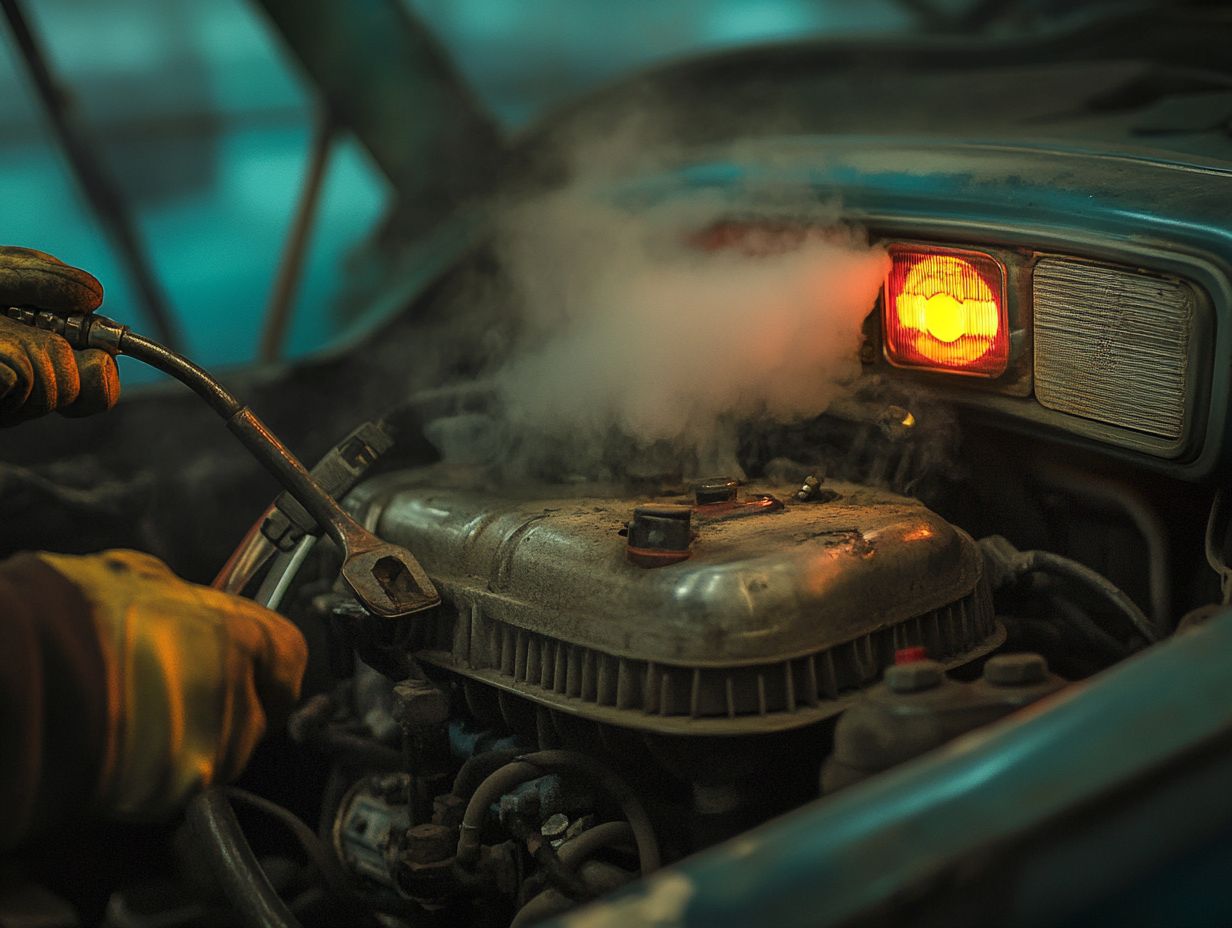
- Engine overheating can be caused by broken cooling systems, lack of maintenance, and extreme weather conditions.
- Warning signs of engine overheating include steam coming from the hood, an illuminated temperature gauge, and strange noises from the engine.
- Regular maintenance and care are crucial to prevent engine overheating, especially in extreme weather conditions. If an emergency arises, follow proper procedures and seek professional help if needed.
Common Causes of Engine Overheating
Grasping the common causes of engine overheating is essential for preventing potential vehicle breakdowns and ensuring optimal performance and longevity of your automotive engine. By being aware of these factors, you can take proactive measures to keep your vehicle running smoothly.
Malfunctioning Cooling System
A broken cooling system is one of the primary culprits behind engine overheating. This often stems from problems in critical components like the radiator or water pump. This essential system plays a vital role in regulating your engine’s temperature, preventing excessive heat that could lead to severe damage.
The radiator dissipates heat from the engine coolant, while the water pump circulates this coolant throughout the system. When either of these components fails, your engine can run hotter than it should. Warning signs include fluctuating temperature gauges, steam rising from the engine, or even an unusual odor these are clear indicators that your vehicle needs urgent attention.
Regular maintenance checks are crucial. They help catch these issues early, ensuring both the longevity and efficiency of your vehicle. Taking proactive steps protects your investment and enhances your driving experience.
Understanding Engine Overheating
Engine overheating occurs when your engine operates at temperatures exceeding its normal range, often due to various mechanical issues and inadequate coolant levels. Several factors can lead to this concerning situation. Insufficient coolant, usually a result of leaks or lax maintenance, limits the system’s ability to dissipate heat effectively. A clogged or corroded radiator can obstruct airflow, leading to inefficiency and elevated temperatures. A malfunctioning thermostat (a device that regulates coolant flow) might fail to control the coolant flow, allowing the engine to overheat.
Understanding these underlying causes is essential for you as a vehicle owner. By properly maintaining your cooling system, you can prevent potentially severe damage to your engine and keep your vehicle running smoothly.
Don’t wait until it’s too late! Learn how to keep your engine cool and ensure a safe driving experience.
Lack of Proper Maintenance
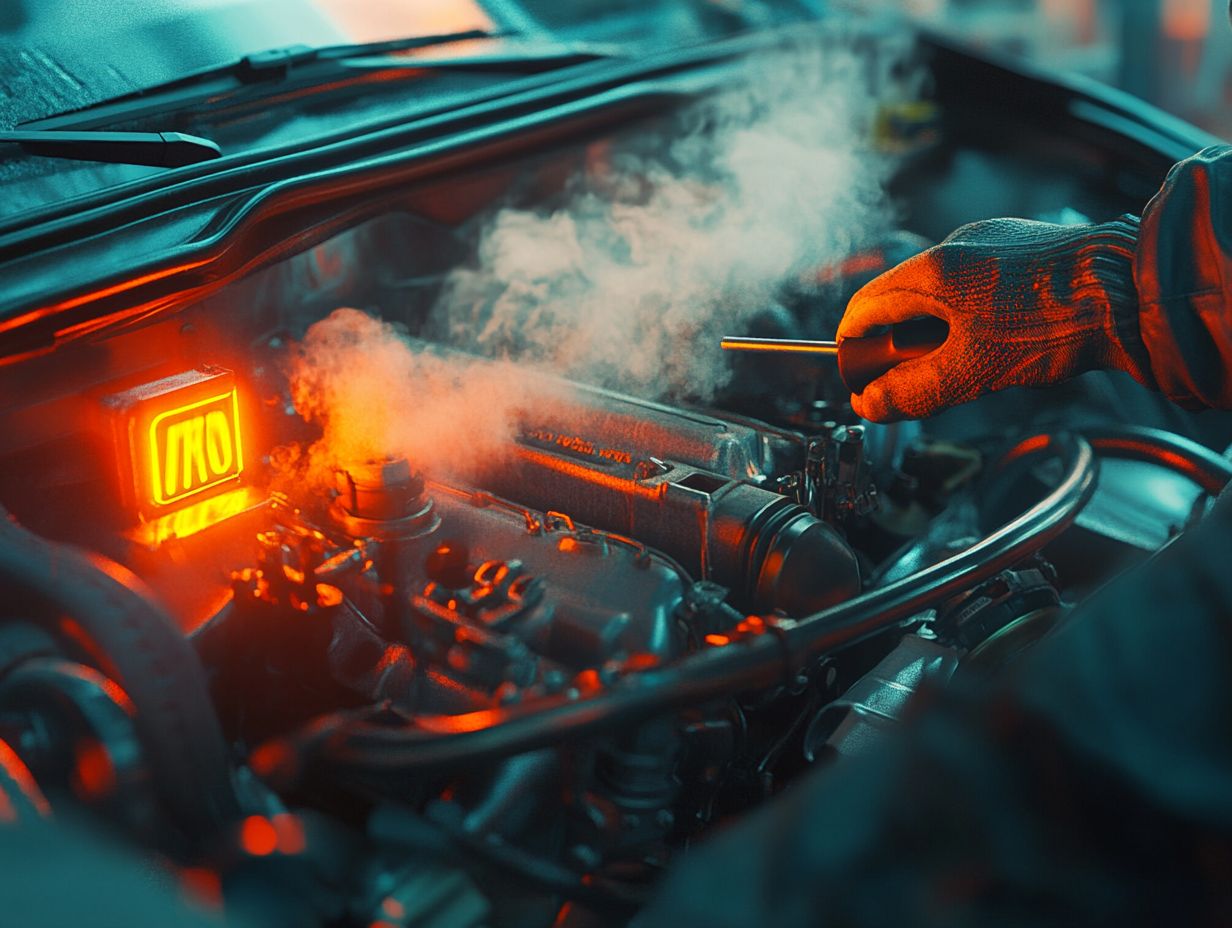
Insufficient maintenance can lead to engine overheating. This is especially true when coolant levels and other vital fluids are neglected.
When you overlook regular fluid assessments, like ensuring the coolant is topped off, you increase the risk of your engine facing excessive heat.
Routine oil changes are essential. Old oil loses its ability to lubricate engine components effectively, which can cause friction and ultimately lead to overheating.
Check for mechanical faults regularly. Spotting issues early can save you from serious problems. Seek professional help when needed. Experts can provide valuable insights and recommendations to keep your engine running s smoothly and efficiently.
Extreme Weather Conditions
Extreme weather can affect your engine. Hot summers and cold winters both pose unique challenges.
As temperatures rise, the strain on your engine increases, heightening the likelihood of overheating. In winter, the coolant system becomes less effective at dissipating heat.
These temperature fluctuations mean that maintaining optimal engine performance requires your attention year-round. Regularly check coolant levels, ensure the radiator is clear of debris, and use the right oil thickness for the current temperature.
Keeping an eye on temperature gauges and watching for unusual engine noises can help you spot issues before they spiral out of control. This ensures reliable operation throughout the year.
Signs and Symptoms of Engine Overheating
Recognizing the signs and symptoms of engine overheating is crucial for drivers. By being vigilant, you can take action to prevent irreversible engine damage or unexpected breakdowns.
Keep a close eye on warning signs! They could save you from a costly repair down the road.
Identifying Warning Signs
Watch for warning signs like a fluctuating temperature gauge, unusual engine noises, or the activation of the check engine light. These signals indicate your engine might be overheating.
These indicators act as vital alerts that something may be amiss beneath the hood. For example, if the temperature gauge swings erratically, it s a clear sign that your vehicle’s cooling system might be struggling.
Strange sounds like hissing or grinding can indicate that various components are under stress, likely due to excessive heat. Ignoring these symptoms can lead to catastrophic engine damage, skyrocketing repair costs, and a significant reduction in your vehicle’s longevity.
Responding promptly to these warnings not only protects your engine but also ensures a safer driving experience.
Preventing Engine Overheating
Prevent overheating with regular maintenance. These simple practices boost your engine’s performance and lifespan.
Maintenance and Care Tips
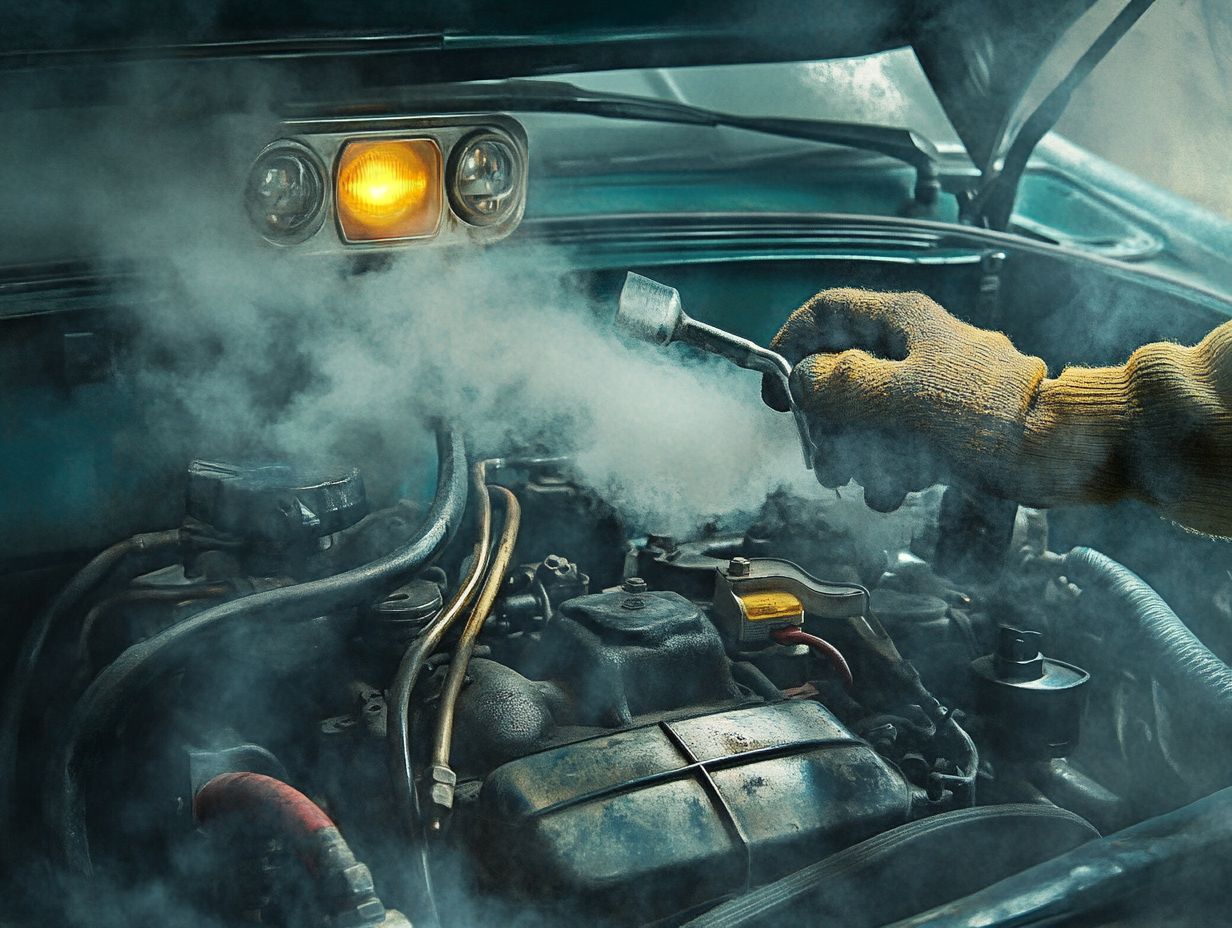
Regular maintenance and care tips are vital for keeping your vehicle’s engine cool and preventing overheating issues.
Consistently checking your coolant levels is non-negotiable. Low coolant can lead to significant engine damage that you want to avoid.
It’s wise to stick to a regular schedule for replacing engine oil, ensuring proper lubrication and heat distribution.
To keep the cooling system functioning effectively, inspect hoses and radiators for leaks or blockages. This proactive approach can save you from serious repairs down the line.
When faced with intricate problems, seeking professional assistance can be invaluable. Experienced technicians have the expertise to diagnose complex issues that might otherwise slip under your radar, ultimately safeguarding your engine’s longevity and performance.
What to Do When Your Engine Overheats
When encountering engine overheating, understanding the appropriate emergency procedures is crucial. This knowledge can protect your vehicle from significant damage and safeguard the well-being of everyone on board.
Emergency Procedures
If your engine overheats, follow immediate emergency procedures. Pull over safely and assess the situation.
Once you ve brought your vehicle to a secure stop, make sure to turn off the engine to prevent further damage. Wait a few minutes to allow the engine to cool down before stepping out. This ensures you’re at a safe distance from traffic.
Inspect the dashboard for any warning lights or abnormalities. These can provide valuable insight into the problem. If you notice smoke or if the engine temperature continues to rise, reach out to a professional mechanic instead of attempting repairs yourself.
This approach prioritizes your safety. It ensures any underlying issues are thoroughly diagnosed and addressed by a qualified expert.
Professional Help for Engine Overheating
If engine overheating becomes a persistent issue, seek professional help immediately. Trained mechanics possess the expertise to diagnose and resolve problems that might elude the average vehicle owner.
Their knowledge helps address underlying issues efficiently, safeguarding your investment and enhancing your driving experience.
When to Seek Professional Assistance
Don’t wait! If your vehicle shows signs of persistent overheating, seek professional help immediately.
If your vehicle shows signs of persistent overheating, even after checking the coolant levels and replacing any faulty thermostats, the urgency of the situation escalates. Unusual noises from the engine like knocking or hissing should raise red flags. These indicate underlying issues that require immediate attention. Ignoring these warning signs could lead to severe problems, including engine failure or costly repairs in the future.
By being proactive, you protect your vehicle’s performance and enhance the safety of everyone on the road.
Frequently Asked Questions
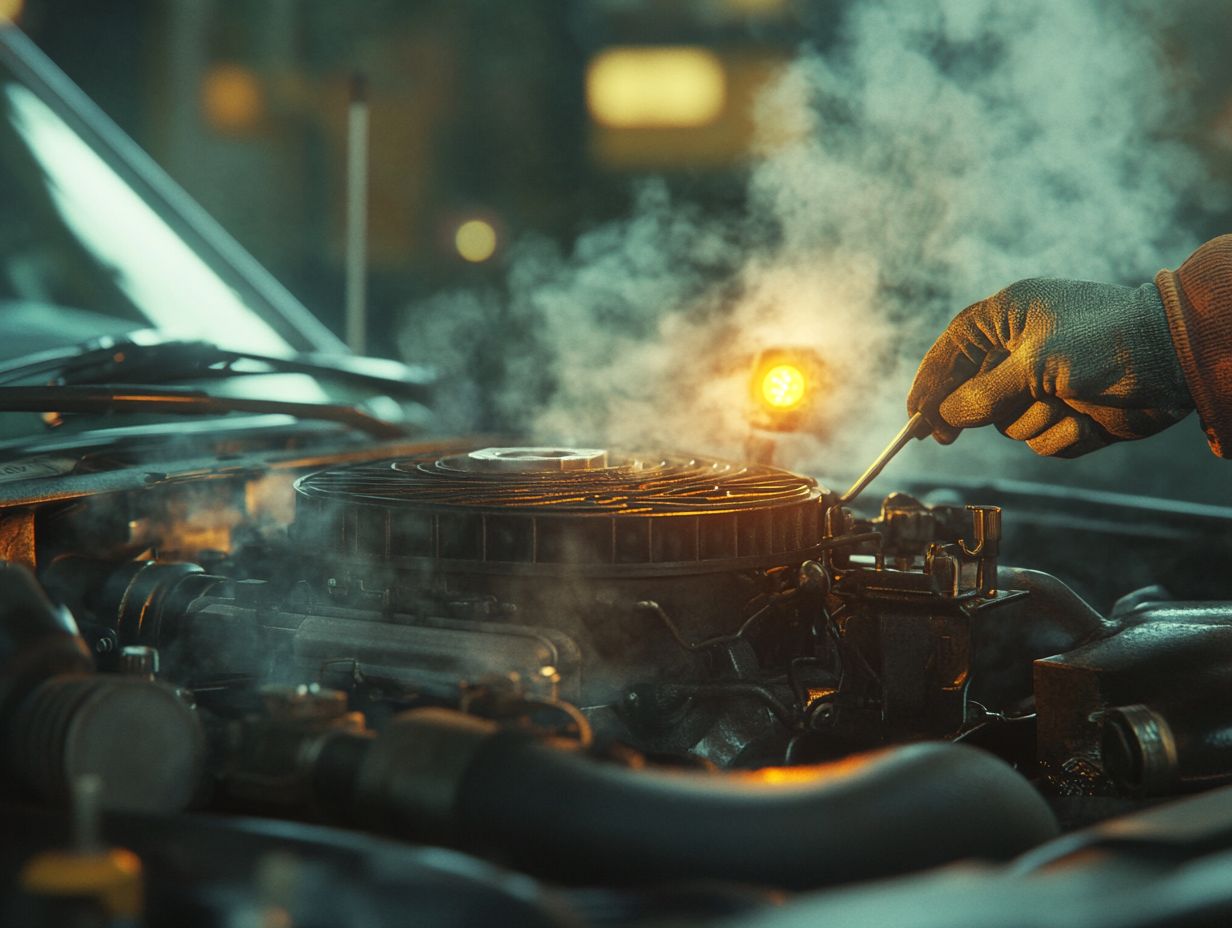
What Are the Main Causes of Engine Overheating?
The main causes of engine overheating include:
- Lack of coolant or low coolant levels.
- Malfunctioning thermostat.
- Blocked or leaking radiator.
- Broken water pump.
- Worn out or faulty radiator hoses.
- Faulty cooling fan or fan relay.
How does a lack of coolant lead to engine overheating?
Coolant regulates the temperature of your engine. If there is not enough coolant in the system, the engine cannot stay cool and will eventually overheat.
Can a malfunctioning thermostat cause engine overheating?
Yes, a malfunctioning thermostat can prevent coolant from flowing through the engine properly, leading to overheating. It may get stuck in the closed position, not allowing coolant to circulate, or stuck in the open position, causing the engine to run too cool.
What factors can contribute to a blocked or leaking radiator?
A blocked or leaking radiator can be caused by various factors, including a buildup of debris or sediment, corrosion, or damage to the radiator fins. These issues can hinder the radiator’s ability to cool the engine properly, leading to overheating.
How can a broken water pump lead to engine overheating?
The water pump circulates coolant through the engine. If it is broken or malfunctioning, the coolant cannot flow properly, resulting in engine overheating.
What are some signs of worn out or faulty radiator hoses?
Signs of worn out or faulty radiator hoses include visible cracks or leaks, a soft or spongy texture, and swelling or bulging. If these issues are not addressed, they can lead to engine overheating.
What should I do if I notice my engine is overheating?
If you notice your engine is overheating, pull over and turn off the engine as soon as it is safe. Don’t ignore it!
Wait for the engine to cool down. Then, check the coolant levels and look for possible issues like leaks or a broken fan. Have a mechanic check your vehicle to find the cause of the overheating.



